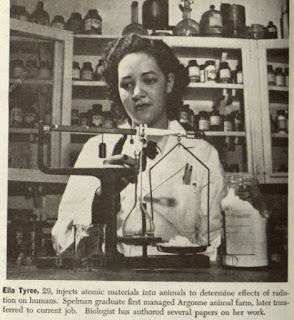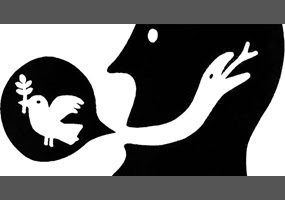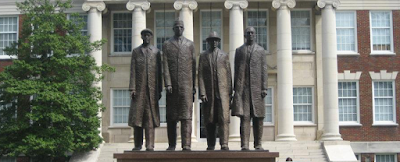 |
| The g-2 magnet arrives at Fermilab to be installed in the Muon g-2 experiment (Courtesy: Fermilab) |
Topics: Modern Physics, Particle Physics, Quantum Mechanics
Has the muon magnetic moment mystery been solved? Hamish Johnston, Physics World
 |
| The g-2 magnet arrives at Fermilab to be installed in the Muon g-2 experiment (Courtesy: Fermilab) |
Topics: Modern Physics, Particle Physics, Quantum Mechanics
Has the muon magnetic moment mystery been solved? Hamish Johnston, Physics World
 |
| Ella Tyree image source: Cliotropic (link below) |
Topics: African Americans, Diaspora, Diversity, Diversity in Science, History, Women in Science
Related links:
Cliotropic, Shane Landrum
Beyond Tokenistic Inclusion: Science, Citizenship, and Changing the Questions, Ruha Benjamin, Ph.D., HuffPost
My expression of PRIDE for the BLACK PANTHER MOVIE are the Promotional posters of the characters within the Movie. Soon I am getting each of these enlarged and posted on a wall or two in the crib. Just wish I had a LARGER crib with more walls!
They can be found during black history month at horroraddicts.net
 |
| Image Source: Debate dot org |
Topics: Commentary, Existentialism, Politics
 |
| Portrait of Katherine Johnson Credits: NASA |
Topics: African Americans, Diaspora, Diversity, Diversity in Science, History, Women in Science
Date of Birth: August 26, 1918 Hometown: White Sulphur Springs, WV Education: B.S., Mathematics and French, West Virginia State College, 1937 Hired by NACA: June 1953 Retired from NASA: 1986 Actress Playing Role in Hidden Figures: Taraji P. Henson
 |
| The Greensboro Four |
Topics: African Americans, Diaspora, Diversity, Diversity in Science, History, Women in Science
NC A&T State University to Commemorate 58th Sit-In; Award-Winning Journalist April Ryan to Keynote
Glad to see this project being a little less American and more a AFRICAN DIASPORIAN musical project. I cannot wait to hear. So is the BLACK PANTHER movie the catalyst that ignites the SPIRIT toward unitfying the children and lost children of the African continent worldwide? This project drops 2/9/2018
 |
| Ali Kaya, Nature |
Topics: African Americans, Civil Rights, Commentary, Cosmology, Martin Luther King
Science behind bars: How a Turkish physicist wrote research papers in prison, Alison Abbott, Nature
Another post Black Panther must see for me is Madeleine L'Engle's A Wrinkle in Time, THE DISNEY MOVIE. I must confess that this project has my heart for two reasons. First is the FACT that this book got me to literally READ on the level of pure enjoyment as a elementary school child. It was my FIRST Science Fiction story ever, was relatable as the main character was MY age at the time. A book was assigned to me by a teacher, a black woman named Mrs. Garrett whom at the time was one of the many teachers (Black) at my school in Oakland, Cali whom I believe took her job for teaching young black children SERIOUSLY. She had a reading list to which we were given a choice of many books at 3rd/4th grade level and I out the blue choose this one just to get her off my back. After forcing the first few chapters, my attention begin to focus when the group encountered the tesseract. I read the entire book in a week and it inspired me to begin to WRITE my own Sci Fi story.
SECOND reason I must see this is that it is directed by "QUEEN SUGAR" director Ava DuVernay my film shero. This is her time showing her hand at a pure IMAGINARY direction which looks better than AMAZING YO! I am used to her work with the REAL and the TRUE which has (to me) all been cinematically OUTSTANDING. Now this YO! Is 2018 going to be the year I have to create a budget for MUST SEE movies? At least in the first three month is looks like..... Enjoy
Oh Yeah FYI: "A Wrinkle in Time", the winner of the 1963 Newbery Medal, celebrated its 50th anniversary in 2013 and continues to thrive. It holds the ranking by many critics as one of the most frequently banned novels of all time.
FYI
http://blackrockcoalition.org/gigs/screening/
Hurry, this invite opens to the public on January 24, 2018
How to get your seats...
We're so excited about the Black Panther movie
that we rented out a theater just for BRC friends & fam.
Before we open the floodgates & invite e'rybody on our e-list,
we're offering 1st shot at seats to BRC members.
The theater only holds 100, so reserve yours today.
$20 per seat (doesn't include $20 food & drink minimum).
Be one of the first 50 to reserve a seat
and get a BRC + BuddhaBug Records Swag Bag.
Followed by a panel moderated by GREG TATE + special guests.
LIMITED SPACE, RESERVE YOUR SEATS NOW.
Click to Reserve
A Collaboration Between the Black Rock Coalition
& BuddhaBug Records Artist Dope Sagittarius
BLACK ROCK COALITION | P.O. Box 1054, Cooper Station, New York, NY 10276
Unsubscribe drocksouljah@aol.com
Update Profile | About our service provider
Sent by members@blackrockcoalition.org in collaboration with
Try it free today
 |
| Image Source: Movie Pilot. Where's a benevolent Kryptonian when you need him? |
Topics: Existentialism, Nuclear Power, Politics, Star Trek
The Nuclear 'Doomsday Clock' Is the Closest to Midnight It's Been Since the Cold War, TIME
Yeah As you guessed with this posting that I am a MECHA HEAD and Love Monster Movies.. I was a GODZILLA Nerd. Well my favorite NEW movie of all time will hit the screen in March with my boi JOHN BOYEGA, just after get over my BLACK PANTHER fix. Seems like a winner since John is playing the son of IDRIS ELBA's character in PR1.
I have included a few STILLS for the movie so you can see why my nerdy behind is so STOKED! And for ALL you haters... Just keep it pushin Please.
 |
| Minjeong Cha, an author of the research article, holds up a sample of the gel infused with chiromagnetic nanoparticles. Photo: Joseph Xu, Michigan Engineering, Communications & Marketing. |
Topics: Electromagnetism, Optical Physics, Nanotechnology
Distorted nano-magnets for agile polarization control
Lauren Barr is a PhD student contributor to nanotechweb.org.
 |
| Sacred Cow Disease - JKS Talent Network |
Topics: Civics, Commentary, Existentialism, Politics, Research, STEM
[1] Why Aren’t There More Smart Americans? Stephen Voss, Wired "Geeks Guide to the Galaxy"
[2] "Notes From the Dangerous Kitchen," a review and a quote from Frank Zappa, Critics at Large
[3] America's Best Selling Pocket Constitution Book, Constitution Facts dot com
Topics: Holograms, Optical Physics, Science Fiction, Star Wars
Display creates 3D images that can be viewed from many angles, Tim Wogan, Physics World
 |
| Credit: Mark Ross |
Topics: Astrophysics, Black Holes, Cosmology, General Relativity
The Puzzle of the First Black Holes, Priyamvada Natarajan, Scientific American
| Mars fission power system concept in the Kilopower project is shown in this undated NASA handout photo released on January 9, 2018. Courtesy NASA/Handout via REUTERS |
Topics: Mars, NASA, Nuclear Power, Planetary Science, Space Exploration
U.S. tests nuclear power system to sustain astronauts on Mars, Will Dunham, Reuters Science